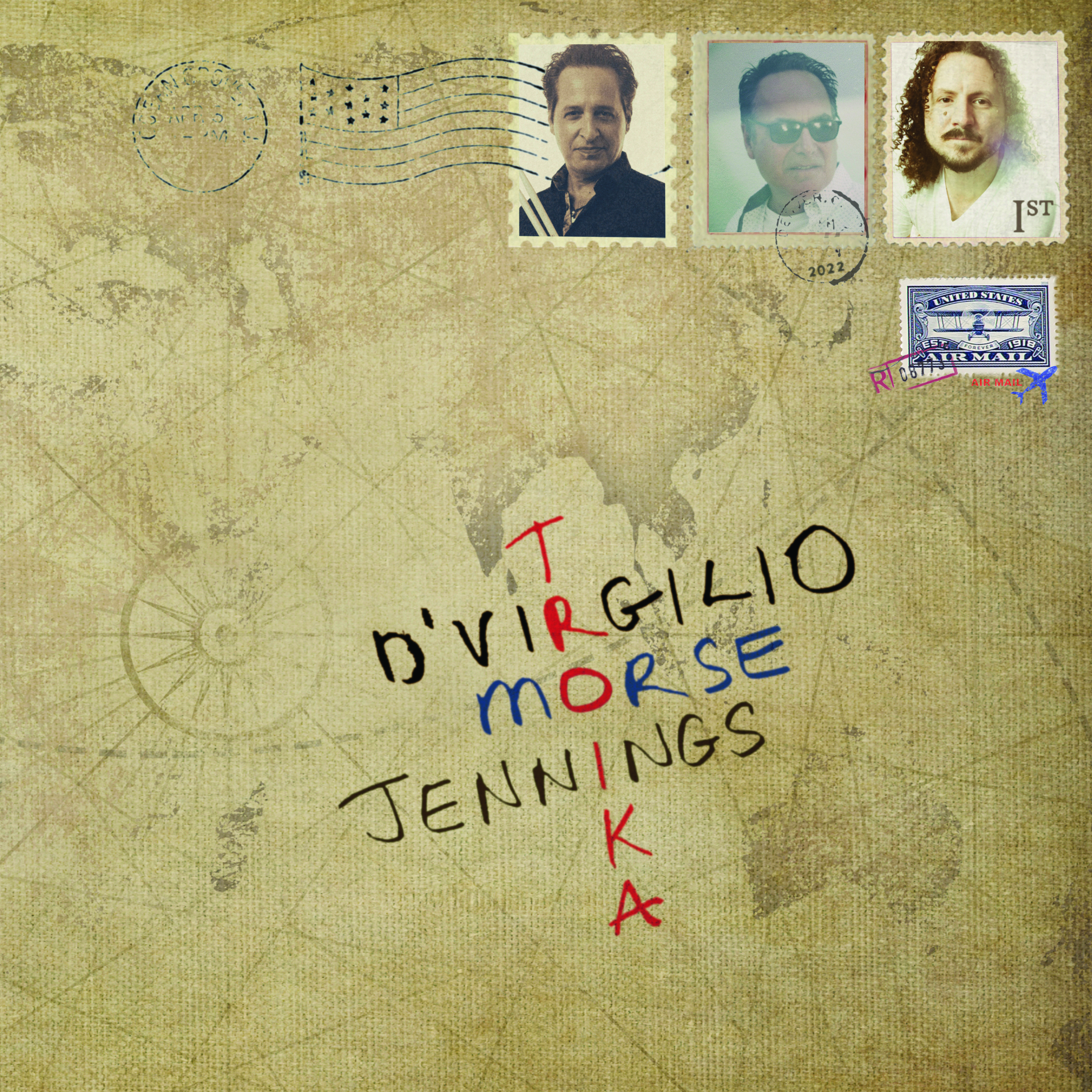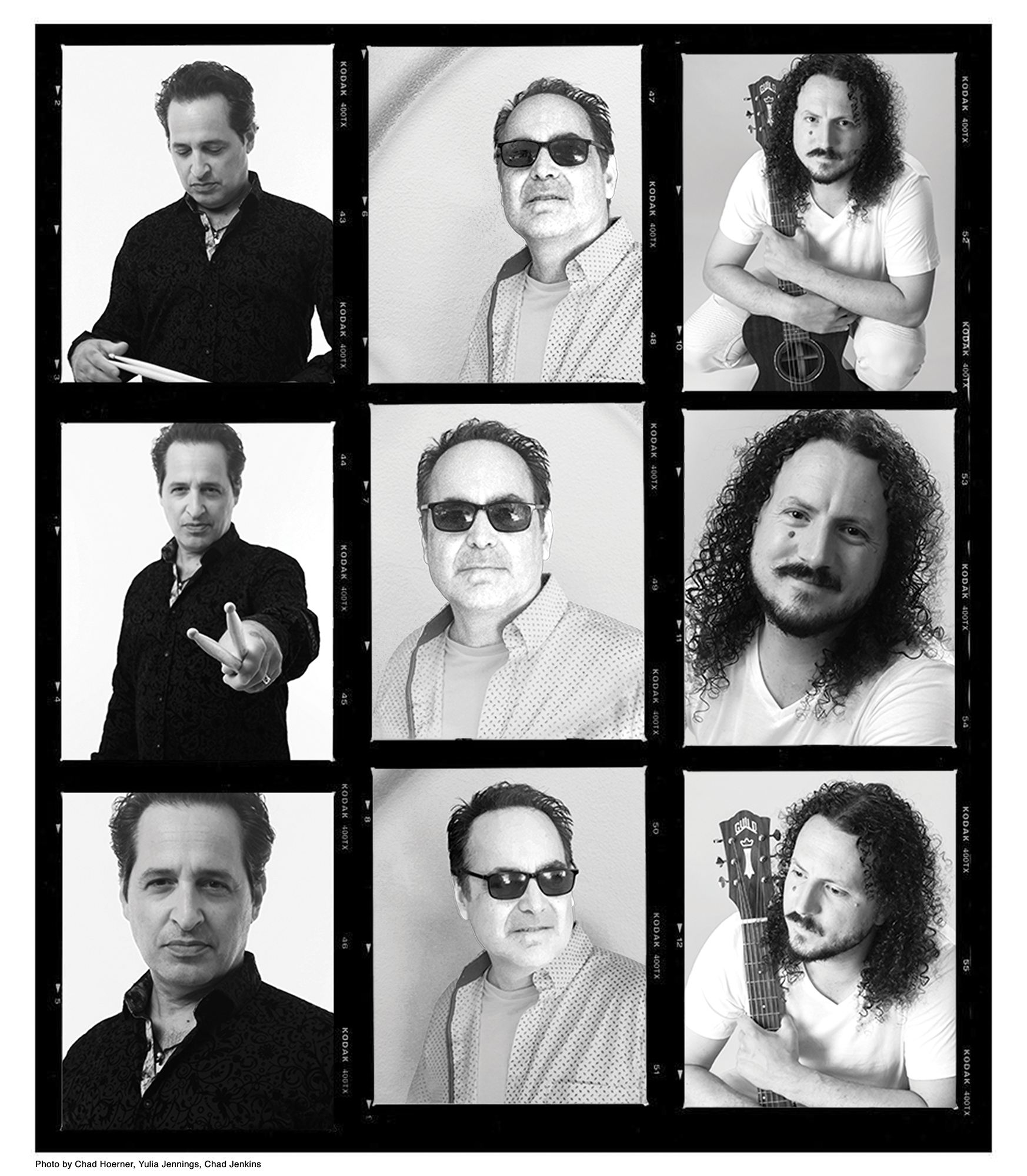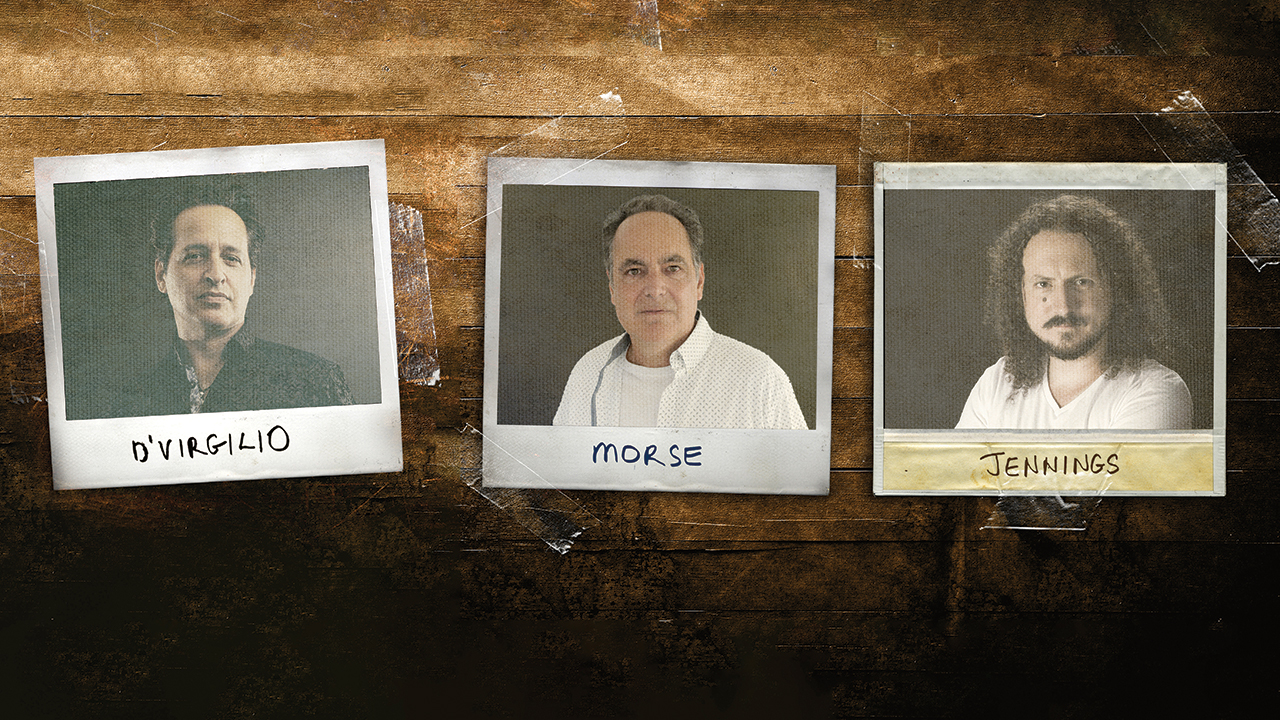Expectations and natural assumptions can be dangerous. The pairing of original Spock’s Beard members Neal Morse and Nick D’Virgilio instantly generates thoughts of spacious, frequently wacky progressive rock that recounts tales of Catfish Men. However, the duo recently linked up with Haken frontman Ross Jennings to record Troika, an album that relies more on tight vocal harmonies than expansive musical journeys. Harking back to the type of guitar-based rock created by Crosby, Stills & Nash, the LP may come as a revelation to some of their fanbase.
“I got a surprise email from Neal at the end of December 2020 asking me if I would be interested in becoming the third voice in the project,” says Jennings. “Although I’ve sung with Neal and met him on various Cruise To The Edges, his point of reference to me as a songwriter and musician was really just Haken and the prog metal side of things. He wasn’t aware if I had any interest in this sort of music, if I could write this sort of music, or if I could play guitar. It was a huge leap of faith on his part to even think of me for this. I was taken aback and confirmed to him that I’m a huge country music fan anyway and love three-part harmony vocals. I’d recently been working on a solo album [last year’s A Shadow Of My Future Self], which was more in that singer-songwriter vein and I was thrilled to be invited into this.”
“Neal started the project initially,” adds D’Virgilio “He reached out to me and asked if I would be interested in doing some sort of singer-songwriter, Crosby, Stills & Nash vocal-inspired record. I said yes almost right away, as I’ve always been into that kind of music. I love regular songs and learning the craft of a great song, plus I’ve always been a sucker for a great love song. It’s not very progressive rock orientated but I love this style as well. It was actually inspiring to think of it like that. We’re locked into the things that we normally do with Spock’s Beard, Big Big Train or Neal’s band [NMB], which are focused on progressive rock with long songs with fancy riffs. It was nice to step away from that a little bit and focus on shorter, simpler stuff. It was a fun experiment.”

The pairing of Morse and D’Virgilio in such a project is a natural one given the sympathetic vocal arrangements they were involved in on tracks such as June from 1998’s The Kindness Of Strangers. That relationship dates back to the early dates of Spock’s Beard, when the two would indulge in nocturnal, campfire-style singalongs at the rear of their tour bus when trekking between gigs.
“We used to do that all the time,” recalls D’Virgilio, laughing at the memory. “That was back in the party days; we all smoked and did stupid things. It wasn’t totally sex, drugs and rock’n’roll as it was pretty tame, but after a gig we’d get on the bus and drive to the next town. None of us were able to go to sleep right away so we would stay up until three or four in the morning just singing songs together. Neal was one of those guys who, along with his brother Alan, knew a million songs on guitar. They could play a ton of stuff, so we would just go on for hours, harmonising with each other and having a great old time.”
Superficially, at least as Jennings attests, the Haken vocalist may appear to be an unusual choice given his background. His talent may be unquestionable, but musically Troika is a significant departure from the heavier leaning that is central to his main band’s success.
“I didn’t know much of Ross’ solo material until I started working with him in this project,” explains D’Virgilio. “Of course, I’m a fan of Haken. I love that band and I have seen them perform a bunch of times live. I’ve known Ross for quite a while and he’s a super-nice guy, easy to hang with and talk to. It was fun to get his take on these tunes and get his feel in these songs. His tracks are really cool and they have a bit of a muso and progressive edge to them. That was just a nice change from Neal’s vibe.”
For Jennings, he admits that there may have been initial concerns that he would feel like an outsider, potentially interfering in and disrupting the musical chemistry that has existed between Morse and D’Virgilio for decades. However, given the remote writing process, these fears were speedily allayed.
“If I had been in the same room as them, then I might have felt more that way,” he says. “I tried not to let that overcome my confidence in any way and I was very humbled to be invited to contribute original ideas to these guys who are known to be fantastic song- writers. It was very liberating for me and gave me a real boost of confidence as well.”

Working in solitude, thousands of miles away from your bandmates and simply exchanging files electronically has an air of soullessness about it. For the most part, the days of bands setting up in residential studios, enjoying camaraderie and musically sparking off each other appears to becoming a rarer phenomenon. Somehow though, in spite of such a clinical writing and recording method, Troika does capture the organic feel the band were aiming for. So how did D’Virgilio find the hermit-like writing process?
“Well, I don’t like it but I’ve been forced to do it quite a bit,” he says. “With Big Big Train, I’m doing my drum parts in the States while they are over there in the UK. It would be awesome to be in the same room together, like a proper band, but it’s easier now to send stuff remotely. You can do it quickly, it’s not as hard and you don’t have to wait days to hear a change that somebody made on your song. You can keep a flow going. It’s not the same as being in the room together but it worked for this record.”
“It wasn’t too alien for me to work that way,” suggests Jennings. “It was bittersweet though, because I’ve been dying to work with Neal all these years. The inability to travel and be in a room to write and record with those guys was a shame, as I’ve been a fan of Spock’s Beard for a long time.”
The album isn’t musically one-dimensional, though, with each of the members contributing tracks that help the flow. There are heavier moments – not least King For A Day and Second Hand Sons – which provide a restrained, fiery balance to the tranquillity. The latter was a Morse composition, as Jennings explains.
“Neal put that one in at the last minute because he felt that the album needed a rockier balance. We also had King For A Day, which grew from my blues rock influences. It was funny though, as I felt that the music I wrote, such as Julia, was paying homage to Spock’s Beard and the stuff that they were writing was moving away from that. So, in the end, there is that reference to their work but it came from a fan.”
Nick D’Virgilio also reveals that he hopes that the trio reconvene to record another album and perform live.
“It would be fantastic to do something else and get a chance to perform these tunes,” he enthuses. “I have a good chunk of tunes and material that is ready to throw in the hat for the next thing and I know Neal is always writing, so I really hope that happens.”
This article originally appeared in issue 128 of Prog Magazine.
